How much does a new kitchen cost? Stay on budget with these tips, plus where to save and where to invest
Work out your budget for your dream kitchen

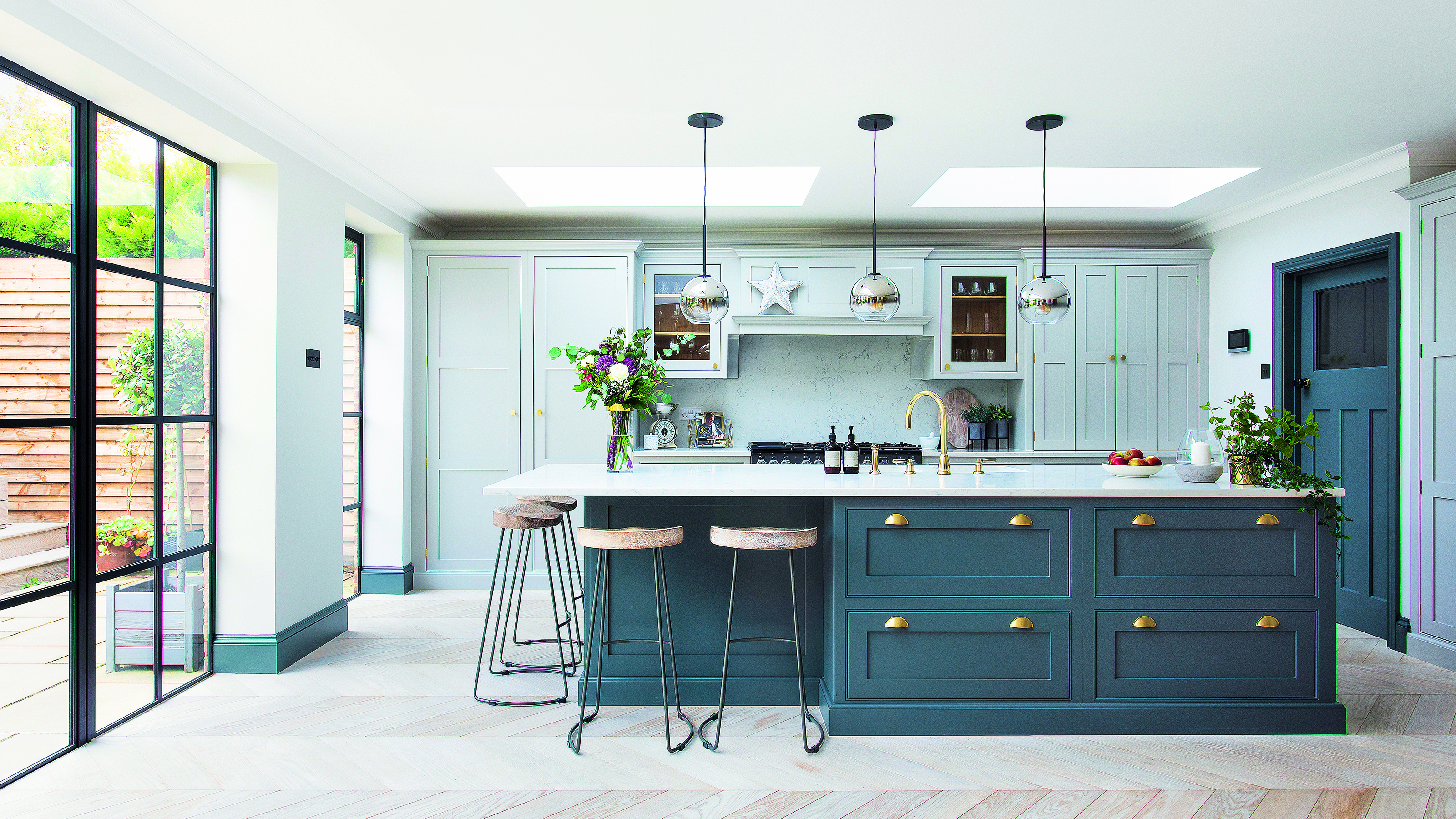
Getting your kitchen right is vital when you're making a big investment to your home, but more important than the design details, is staying within budget. It can be really tricky to determine just how much does a new kitchen cost, making it difficult to adequately plan, which is why we've spoken to experts to break down the details.
From the size to materials used and appliances to fitting, there's a wide range of elements that will affect the bottom line of your kitchen renovation ideas, so we've spoken to the experts to break down what you should expect to pay for each of these, as well as where you should save and where you really shouldn't cut corners.
Always remember to gather information from suppliers early on in the process before you commit to anything. ‘When shopping the market and gathering quotes, it’s best to keep the competitor's price to yourself in the first instance,' advises Al Bruce, founder of Olive & Barr.
'Then once the quote is through, compare the quality and details, such as the type of handy storage units or the finish of the worktops. Never scrimp on quality, a kitchen will last you for years to come.'
So, with that in mind, let's crunch some numbers...
How much does a new kitchen cost?
The answer to how much does a new kitchen cost is, unfortunately, as long as a piece of string depending on the size of the space, materials sued and other differentiating factors. However, we have got some ballpark figures to give you before we talk you through working out how much your specific dream kitchen may cost.
'For a bespoke kitchen, you are looking at a starting price of £35,000, while lower end can be around the £5,000-£10,000 mark,' advises Richard Davonport, managing director at Davonport. 'Where you live will also be a huge factor as installation costs in London and the South will always be higher than in the North of England.'
Sign up to our newsletter for style inspiration, real homes, project and garden advice and shopping know-how
Whether you're going for a small budget kitchen, or a large, bespoke design, there's a good rule of thumb for working out what proportion of the total you should be spending on each element. 'A standard rule for the percentage of the budget is 30% for kitchen cabinets, 10% for kitchen countertops, 14% for kitchen appliances, 4-5% for kitchen plumbing, 5% for electrics, 2-5% for kitchen flooring, and the rest for labour and unexpected costs,' explains Richard.
Depending on how much of a transformation you want and how good the bare bones of your kitchen are, you may not need to replace the whole kitchen. If you already like your current kitchen layout, then consider just replacing the most visible and tired parts of the kitchen, which is a great way to cut down on how much does a new kitchen cost.
How much do kitchen cabinets cost?
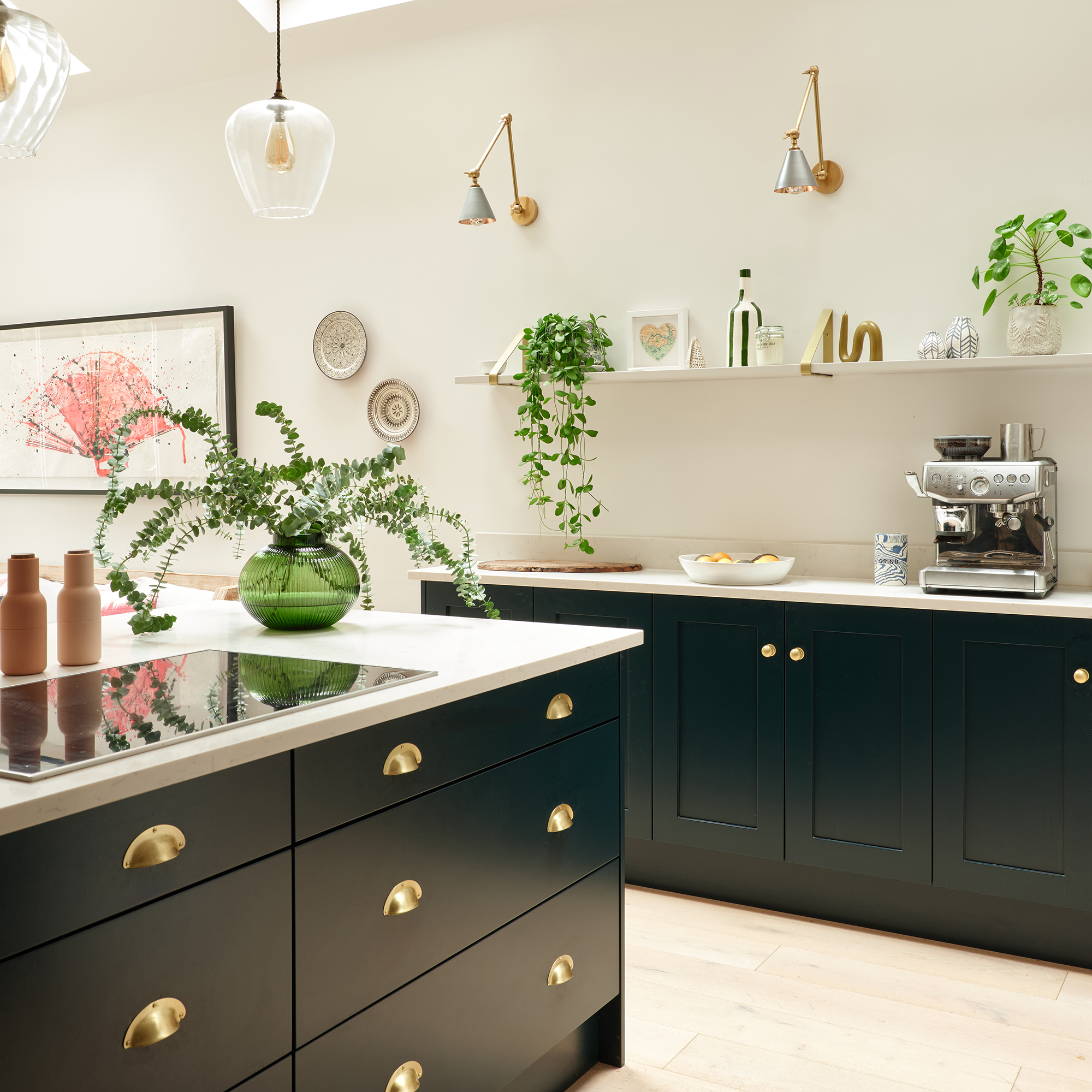
Since your choice of kitchen cabinets takes up a large proportion of the budget, they're a great place to assess when getting started on your project.
The cost varies depending on the quality, style, materials and whether they're flatpack, factory-assembled or custom-made. It's possible to buy eight units for a small galley kitchen for around £1,000-£1,500 at retailers such as IKEA, B&Q, Wren, Magnet or Homebase. These are usually flatpack, so you'll need to add the installation cost. This is where you can save money, if you're able to fit them yourself.
Factory-assembled cabinets in customisable options, for example colours, sizes and textures cost more. Retailers such as Magnet and Wren offer these from around £3,500 for eight cabinets (excluding installation).
If you're looking at bespoke cabinetry, then it's much harder to estimate as this varies on every decision you make. 'If you can go bespoke, then do,' Richard from Davonport advises. 'Quality craftsmanship costs more upfront but saves money long-term, as high-quality cabinets can last up to 30 years, and can be updated fairly easily by being repainted and with new hardware which can make them look as good as they day they were first installed.'
On the other hand, if you can avoid replacing your cabinets then you'll be saving yourself a large chunk of cash. 'If existing cabinet carcasses are in good condition consider refacing,' suggests Elizabeth Sherwin, creative director of Naked Kitchens. 'It's cost effective and hugely customisable with a range of door styles, colours and finishes to choose from.
How much do worktops cost?
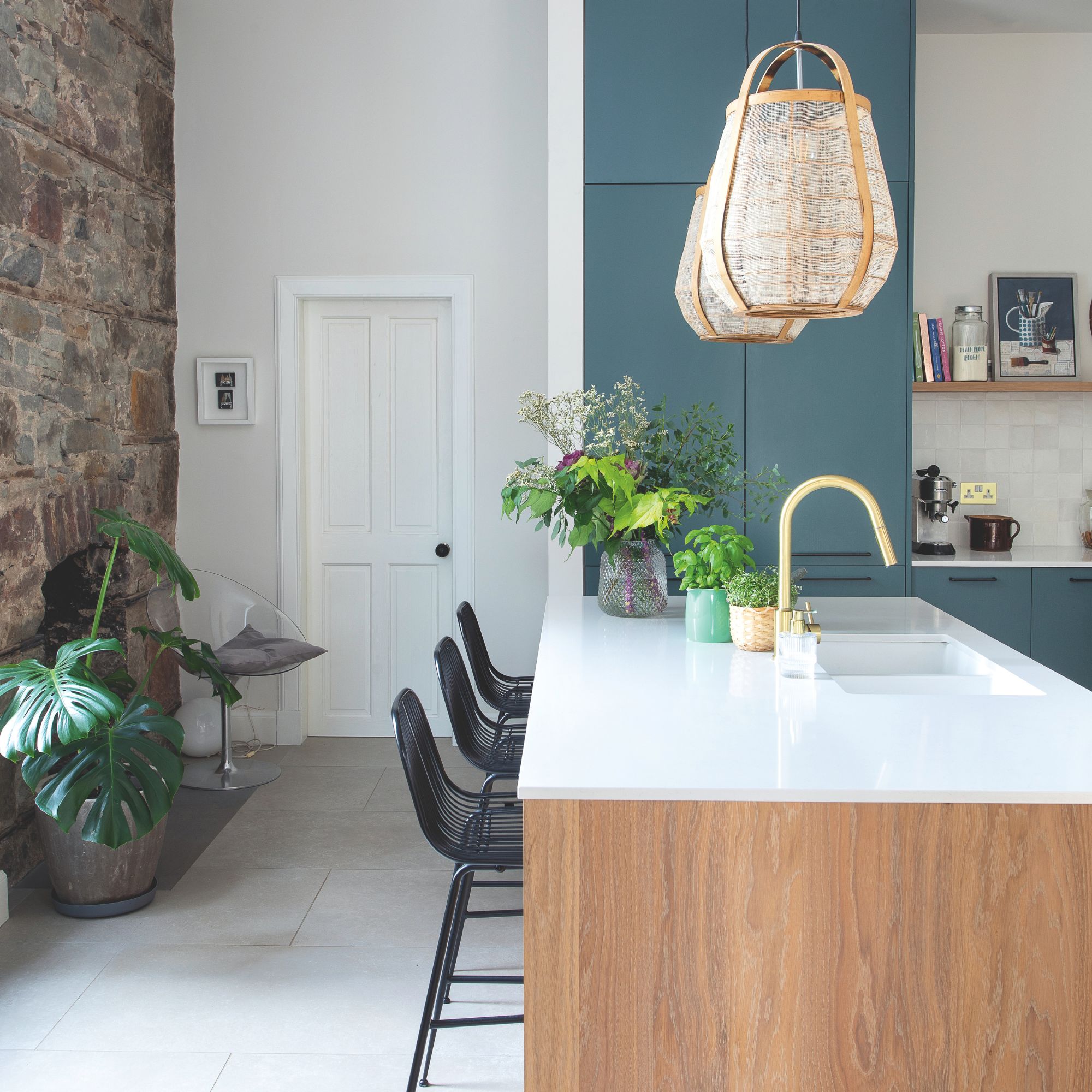
Like with cabinets, worktops range in costs depending on variables like chosen materials.
'If you’re hoping for a large grain quartz, you’d need to budget for anything between £6,000-£10,000 depending on kitchen size,' elaborates Molly Chandler, Designer, Willis & Stone. 'For a smaller grain quartz, you’d be looking in the region of £4,000-£7,000 and for oak worktops, you’d be looking between £1,500-£3,500.'
At the budget end are laminate kitchen worktops. These can be bought from around £100 per metre when made to fit, and for even less if you're able to use a standard size. 'Laminate worktops have evolved over the years and are now available in fantastic stone or wood-effect finishes, giving you fantastic looks for less, and allowing you to upgrade other elements in your kitchen,' notes Nadine Kimani, marketing manager from Kutchenhaus.
'A good tip for managing how much does a new kitchen cost can be to mix work surface materials, breaking up runs of expensive materials with more cost-effective choices,' adds Graeme Smith, head of design at Life Kitchens. 'This mixed material approach can also give unique look in your kitchen.’
How much do kitchen appliances cost?
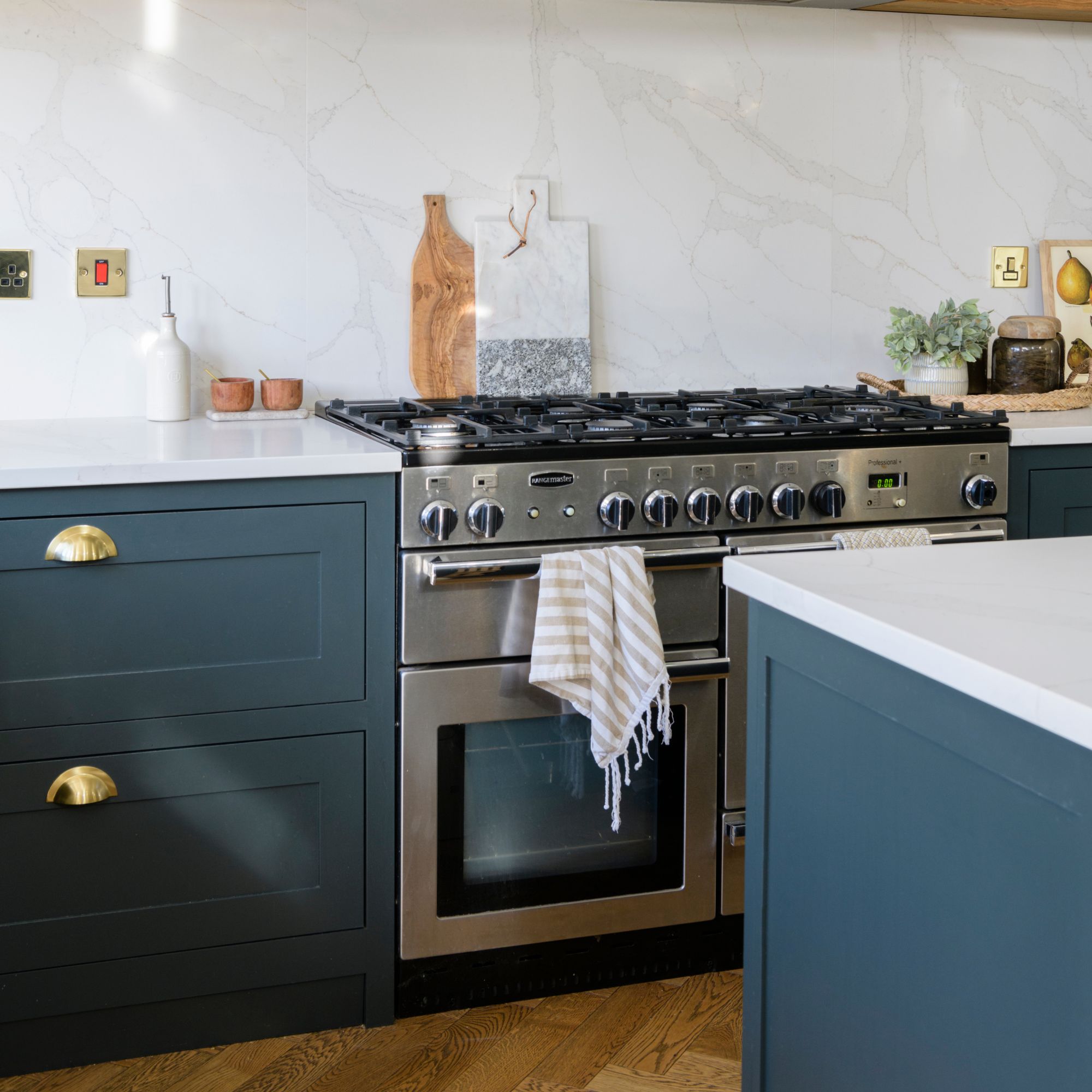
Once you have chosen the kitchen appliances you want, the cost comes down to the quality and type of the appliances and the brands you want. IKEA's most basic oven starts at £199, going up to £879 for a smarter one with more functions.
At John Lewis, a fridge-freezer can vary from around £300 to over £3,000 depending on the functionality and manufacturer.
'I would budget around £8,000 for a large kitchen,' estimates Dave Young, founder of HUSK kitchens. 'Appliances make up a large percentage of your budget if buying new, so do research into which brands are best value and invest only when you think it makes sense to. Do consider investing in a boiling water tap such as the Quooker, they speed up food preparation and free up worktop space, they are a game changer.'
Make sure to really assess how serious you and your family are about kitchen and which items are absolutely necessary in your space, but make your choices carefully. It's also worth thinking about kitchen appliance layout ideas too, so that your kitchen works harmoniously, as well as looking good
'It’s definitely a good idea to invest in reliable appliances, as these will likely last a long time, saving you money in the long run,' advises Molly from Willis & Stone. 'For example, if for any reason one of those appliances stops working there’s a possibility your worktops and cabinetry will need to be altered to suit a new appliance model, adding in costs not far down the line.'
Installation costs also need to be taken into consideration when thinking about choosing your appliances. 'Fitting costs very much relate to scale and complexity of the project,' points out Nadine from Kitchenhaus. 'A dry fit installation of kitchen units, laminate worktops and final fix of appliances could be anything between £2,000 to £3,000. Schemes that require electrical amends, plumbing work or expert personnel would be a lot more.'
How much does a budget kitchen cost?
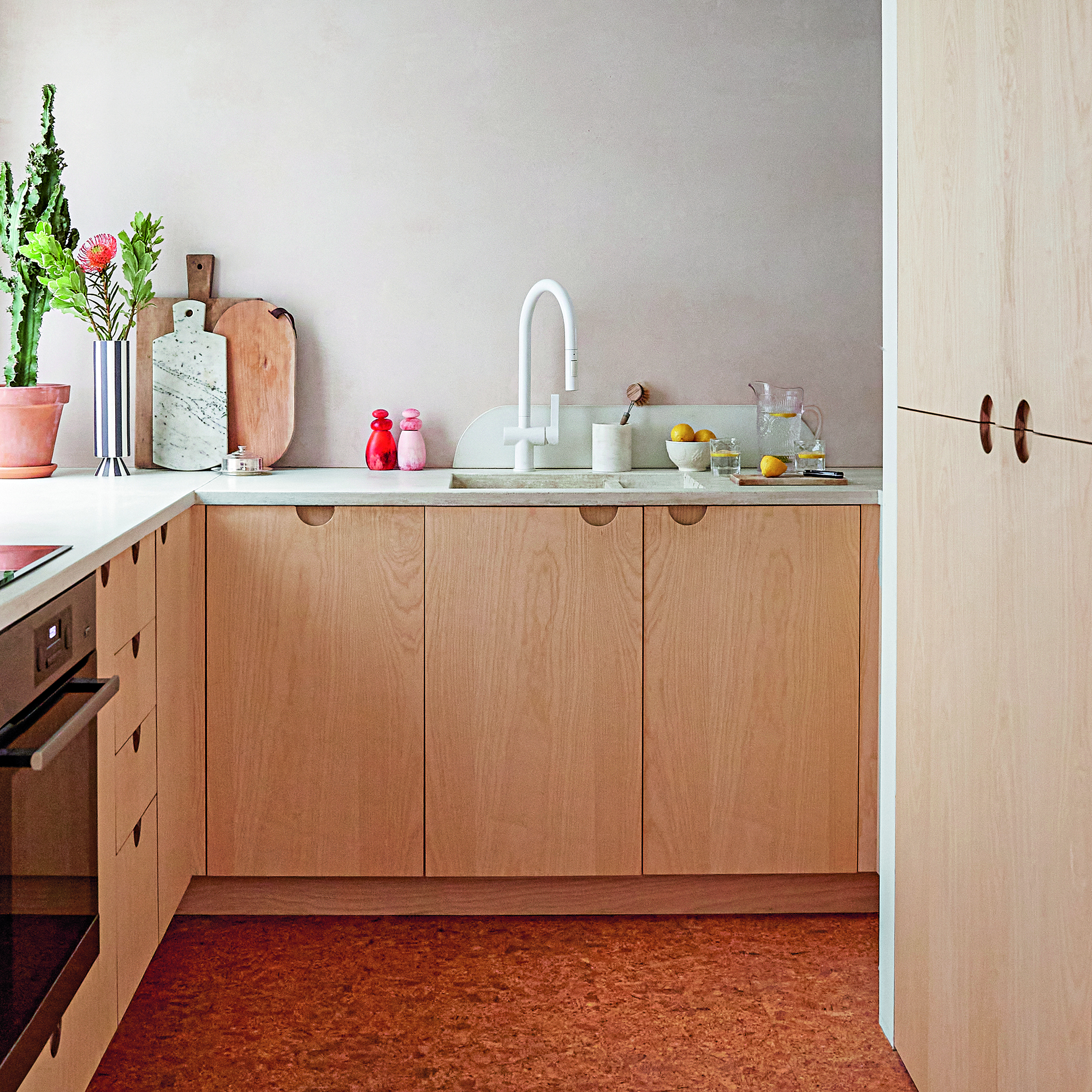
If you are on a budget, fear not because you can still revamp your kitchen with budget kitchen ideas and give it a refresh. ‘If you do decide to buy a new kitchen, a budget kitchen starts at around £5,000,' advises Looeeze Grossman, founder of The Used Kitchen Company.
However, you can alternatively consider second hand kitchens or ex-displays. You can save up to 50-70% off the RRP with used or ex-display kitchens including worktops and appliances starting at just £1,750.
If you are going down the brand new route, then budget carefully from the off. Start your money-saving journey by removing any old kitchen units yourself, depending on their condition you may even be able to resell them. However, when it comes to any gas or electric appliances leave it to a professional to deal with.
Another trick to save money is to use a local kitchen fitter when installing your kitchen because they will often cost less than those from large kitchen companies. You may also be able to get discounts on kitchen units and appliances from local kitchen specialists.
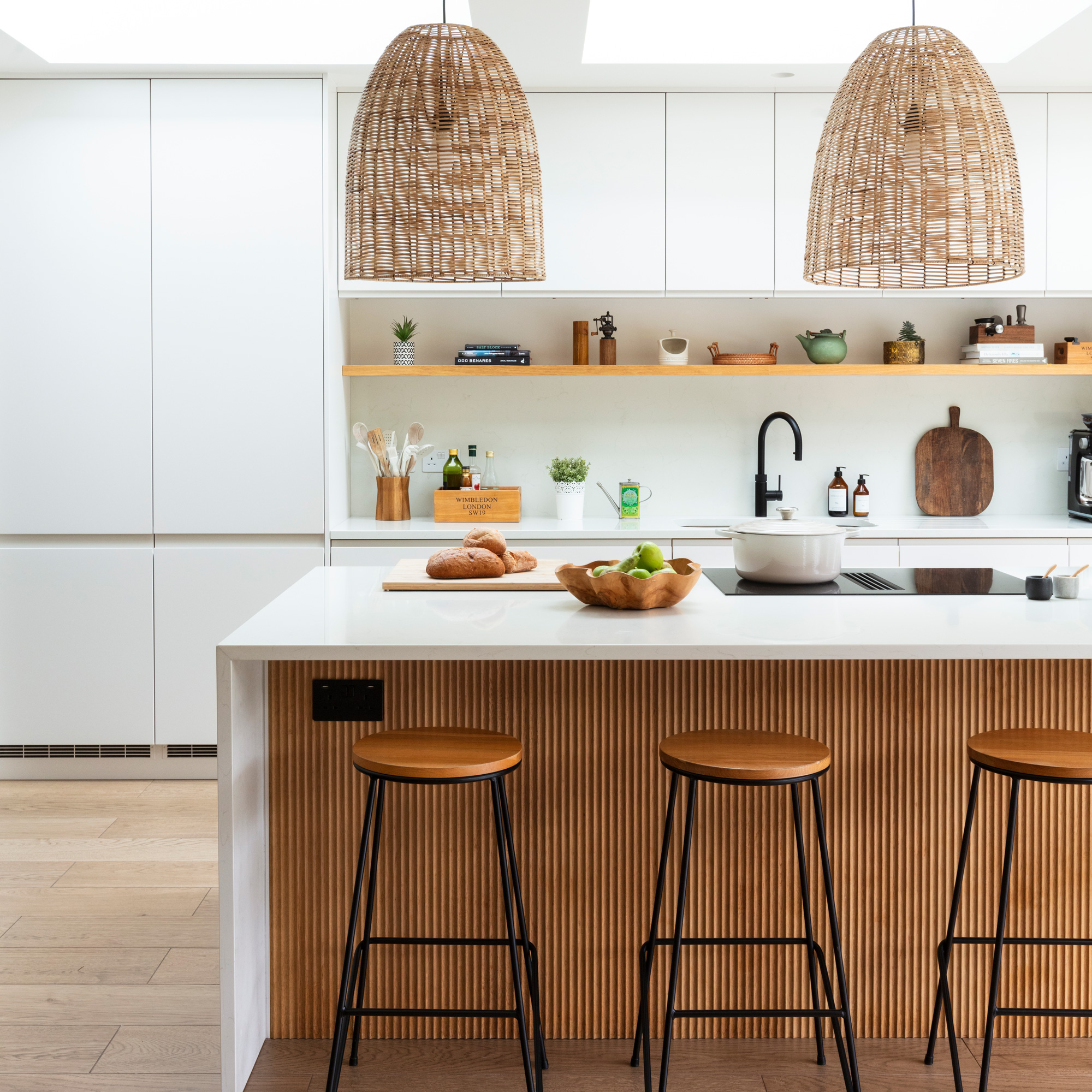
If the budget is really right and you don’t need new worktops or appliances, from under £1,000 you can get chipboard or MDF cabinetry, faced with materials such as veneer or laminate. These will be sold flatpack, so will require you to get stuck in to install your kitchen.
‘If you are planning a new kitchen and are on a tight budget the question to ask yourself is where you need to invest, rather than where you need to cut back,’ advises Ben Burbidge, managing director of Kitchen Makers.
‘Choosing high quality materials is key for the cabinetry, so be careful not to over-spec elsewhere. You can find highly durable and affordable worktops, tiles and flooring which not only look great but perform brilliantly. Similarly, ask yourself if you really need the top of the range hob or fridge freezer, entry level products are equally as functional.'
‘Design wise it may be prudent to explore alternative layouts to islands – such as peninsular design,' continues Ben. 'Similarly, you can team your lower cabinets with open shelving which, if you don’t need huge amounts of storage, can be a cost-effective design tweak.’
Al from Olive & Barr also notes that 'If you're looking for areas to save money, drawers are more costly than doors.'
How much does a mid-range kitchen cost?
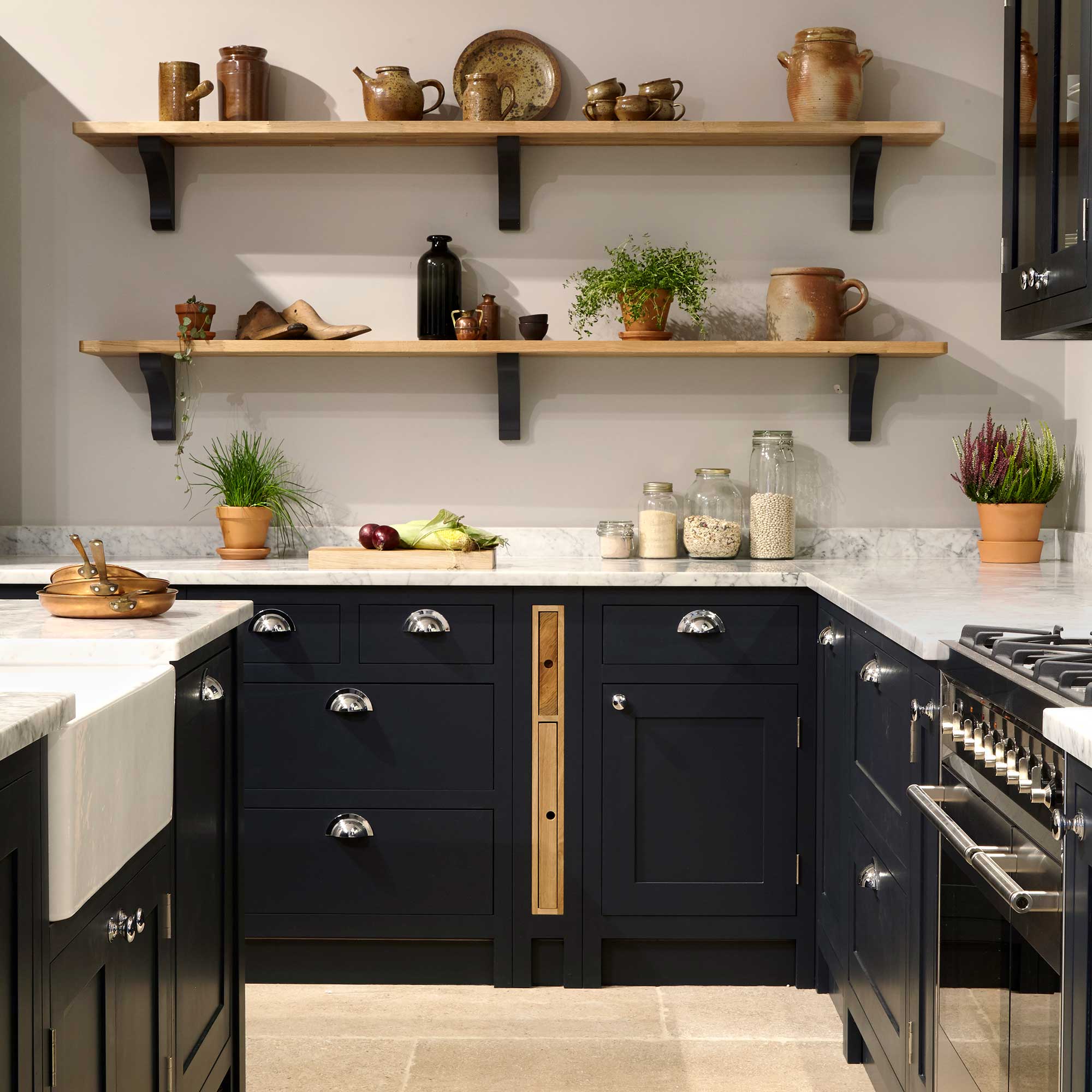
At Magnet or Wren a small kitchen from one of their premium ranges including appliances, worktops and installation can be bought for around £6,500-£9,000. Using a kitchen designer is also an option if you need help working out the best way to transform your kitchen, Kitchen designers can provide functional and stylish ideas and solutions to give your kitchen the wow factor and function properly.
The cost of a kitchen designer depends on the size of your project and the level of detail you need. On average it costs between £770-£5,000 and with the largest projects designers will often take a percentage of the overall project cost, on average 8%.
How much does a bespoke kitchen cost?
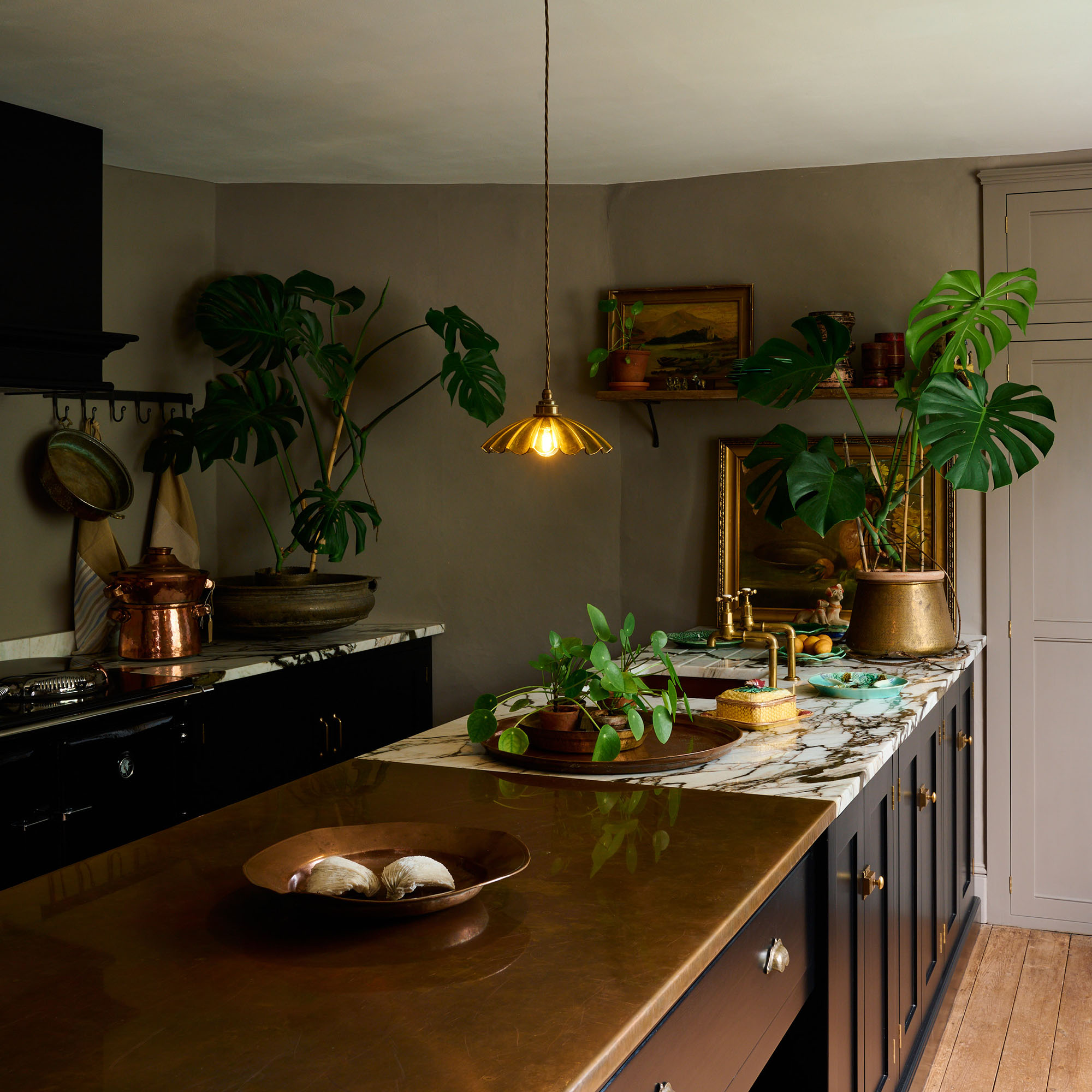
Typically for most high-end brands, these start at around £35,000, although a bespoke kitchen on a budget can be done.
William from Herringbone explains approximate pricings for bespoke kitchens by size to help us get an idea of what they may cost:
- Small Kitchen: A small kitchen will be a space that has less cabinetry in the design, but does not always mean it will be a small space. The entire kitchen (including bespoke cabinetry, quartz worktops, custom tap/handles, mid-range appliances, installation and VAT) averages between £35,000-£45,000.
- Medium Kitchen: These generally have an island with seating for 2-3 people. The entire kitchen (including bespoke cabinetry, quartz worktops, custom tap/handles, mid-range appliances, installation and VAT) averages between £45,000-£60,000.
- Large Kitchens: These typically have an island with seating for 4+ people, or they may have additional storage throughout the room such as drinks cabinets, custom banquette seating, bespoke dressing units etc. Bespoke cabinetry costs are generally £40,000+, and the entire kitchen (including bespoke cabinetry, quartz worktops, custom tap/handles, mid-range appliances, installation and VAT) normally starts £60,000+.
When fitting a bespoke kitchen the actual time it takes to fit is around 10-15 days. However, the overall process could take up to six months, including the design, planning, delivery and installation process.
How much does a kitchen fitting cost
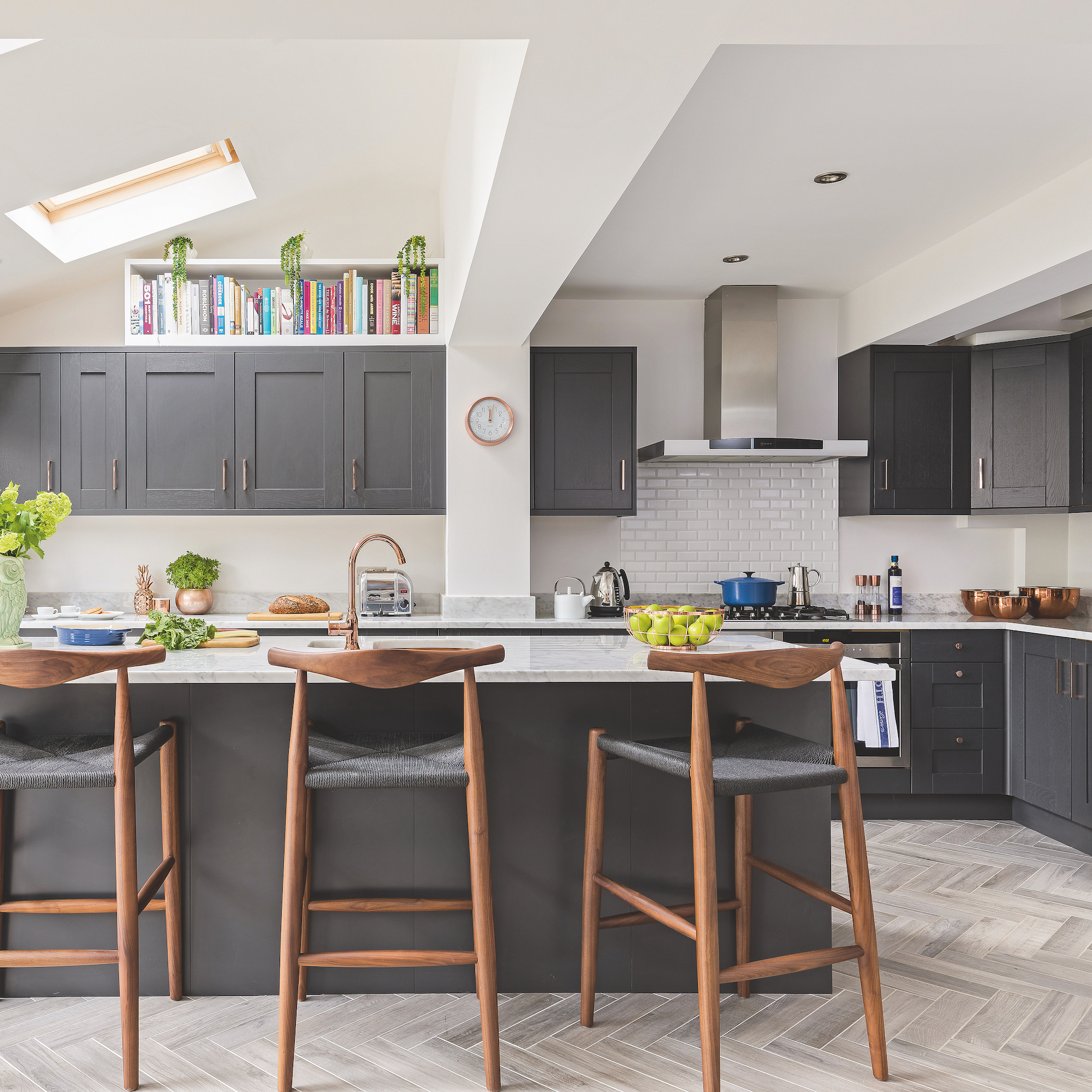
It's not just about how much does a new kitchen cost in parts - the fitting is important to consider, too.
The cost of kitchen fitter is around £120 - £140 a day, but rates are often higher in London and the Southeast. A plumber and electrician will often be needed if you are installing a kitchen from scratch. For companies that have kitchen fitters who can also do electrics and plumbing, their day rates will be higher than the average.
Chis from Hush Kitchens estimates the total fitting of an everage kitchen to be 'between £2,000 and £4,000'. 'Usually, for one tradesperson to fit the units, worktops etc but not the plumbing, budget for around £3,000,' agrees Dave from HUSK Kitchens.
'We recommend obtaining multiple quotations for installation,' advises Damian Walters from The British Institute of KBB Installation (BIKBBI). 'Make sure there's a clear, itemised price for all elements of the install and a schedule of works. This should include preparatory works, fitting of appliances and, in some cases, clarification of materials to be used. There should also be a legally binding contract for service in place. This should specifically cover payment terms and the process required should a dispute arise.'
'It's also recommended that some form of payment protection is in place. As an example, those that cover payments made by credit. We would strongly advise consumers not to part with cash, regardless of the incentive as this offers no protection in cases of dispute.'
Where to save on new kitchen costs

'A good way to keep costs down is by not ripping out the whole kitchen,' says Rated People's Asad Choudhry of Glam Kitchens. 'By replacing the doors, pelmets, worktops and tiles you could save thousands and it would look brand new.' Painting old kitchen cabinets is another way to save money.
If you are starting a space from scratch or completely replacing a kitchen then planning will be your best friends in order to keep costs at a palatable level. 'The best place to start is to work out a budget ahead of any designing stage, though make sure to always have a contingency fund of around 15% of your overall budget,' suggests Richard from Davonport.
'It’s a good idea to always communicate with your designer to ensure they are aware of your budget so they can suggest more affordable options and ensure that the kitchen layout is practical but suits your budget,' advises Molly from Willis & Stone.
'Once you have your design and plans, really try and ensure that you don’t change your mind mis-project as this can be very costly,' continues Richard. 'Making layout changes or switching materials partway, leads to delays and higher costs overall.'
'If you’re hoping to save money in the kitchen where possible, your detail choices can aid this, such as opting for more cupboards instead of drawer sets, opting for a decorative tile splash back instead of quartz, opting for oak/wooden worktops instead of quartz or finding a more affordable hardware supplier,' adds Richard.
Where to invest in a new kitchen
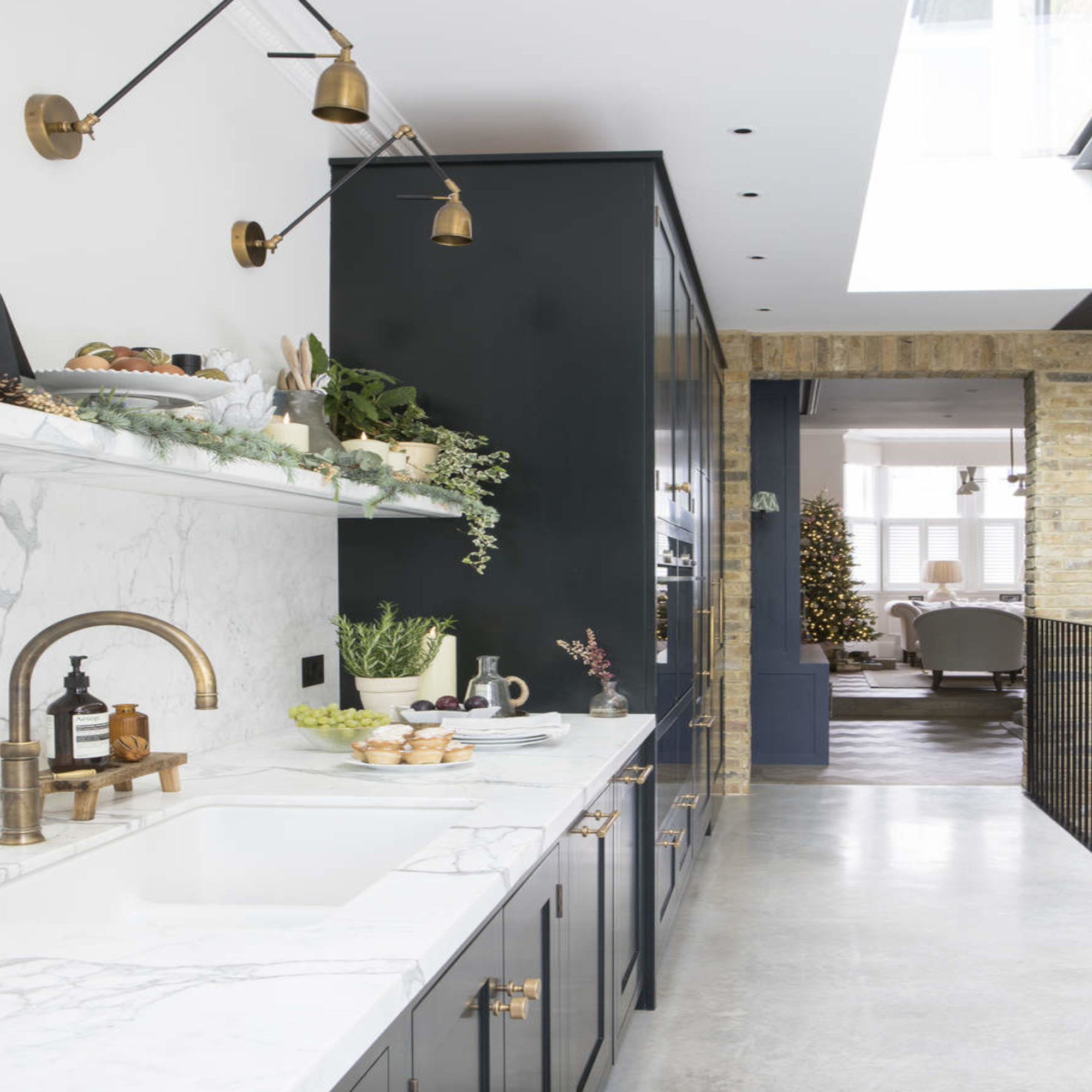
‘Where you should spend and save in the kitchen is almost always down to the individual and their personal needs,' notes Dawn Filkins, head of creative at Smile Kitchens. 'Everyone should consider what areas or items they will use the most, as well as what is most important for them to have in a kitchen space.'
For a good rule of thumb, Chris from Hush suggests investing in good quality cabinetry. 'Appliances, taps and even worktops can be upgraded in the future so these are areas you can cut back on to keep within budget,' he explains.
'I'd recommend allocating budget for your kitchen flooring,' adds Alex Main, director at The Main Company. 'It needs to be durable and up to the task of handling spills, moisture and heavy foot traffic. If you opt for a cheaper floor, it only means it will need to be replaced later on, so it’s worth investing now for longevity.'
'Finally, invest in an experienced kitchen fitter who knows what they’re doing,' recommends Brani from Scavolini. 'An expensive kitchen will look cheap if it isn’t fitted properly and will give you endless problems. A good fitter, however, can make a relatively inexpensive kitchen look incredible and function beautifully.'
FAQs
Can I DIY a new kitchen?
This depends on your DIY skills and how complex the install, and there are plenty of DIY kitchen ideas. Fitting cabinetry is within the scope of someone with decent joinery capabilities. However, gas or electrical appliances have to be installed legally by a registered professional with the relevant certification.
'Someone would need competent skills in carpentry, tiling, plumbing and building work,' says Asad from Glam Kitchens. 'They'll also need the right equipment. For example tools to cut and install worktops, cut tiles, and carpentry machinery. It’s important to note that a good kitchen fitter can make a cheap kitchen look beautiful and expensive. But an expensive kitchen in the wrong hands can have the opposite effect.'
'Some appliance manufacturers and retailers offer an installation service that includes the removal of old appliances,' adds Damian from BIKBBI. 'Otherwise, these will need to be done by a qualified gas engineer (Gas Safe registered) or electrician (NICEIC/other regulatory bodies).'
'Our recommendation would be to appoint a professional installer. They'll have a good understanding practical installations, legislation requirements and, importantly, trouble-shooting experience and expertise. Installation is complex as it covers multiple trades, regulations and competencies.'
While there's clearly a lot of variation in how much a new kitchen costs depending on all sorts of factors, this guide should help you work out a rough idea of what you should expect to spend before you get going with your new project.

Thea Babington-Stitt is the Assistant Editor for Ideal Home. Thea has been working across some of the UK’s leading interiors titles for nearly 10 years.
She started working on these magazines and websites after graduating from City University London with a Masters in Magazine Journalism. Before moving to Ideal Home, Thea was News and Features Editor at Homes & Gardens, LivingEtc and Country Homes & Interiors.
- Holly CockburnContent Editor
- Holly WalshContributor
- Jacky ParkerContributor